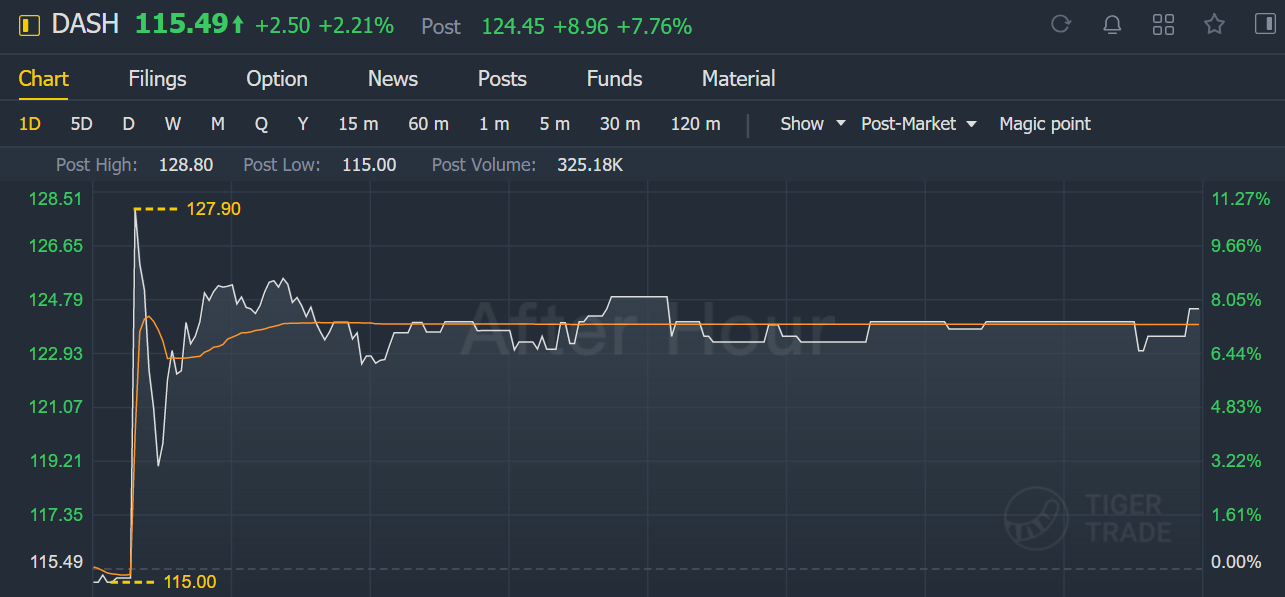In releasing its first-quarter results Thursday, DoorDash Inc. answered nagging questions about how well delivery can fare as the coronavirus pandemic subsides and diners begin to eat out again: pretty well.
The food-delivery app company said it had gross orders of $9.9 billion for the quarter, well above analysts' expectations of $8.97 billion. That was more than three times its gross order volume of $3.08 billion in the year-ago quarter. In addition, its revenue nearly tripled, rising to $1.08 billion from $362 million in the year-ago quarter.
"We're rooting for restaurants to reopen and succeed," Prabir Adarkar, chief financial officer of DoorDash $(DASH)$, told MarketWatch. "It's possible for that to happen and for people to still want delivery. We're seeing that those two things can coexist."
On the company's earnings call, Chief Executive Tony Xu said that even as people resume going to restaurants, most of them "eat 20 to 25 times a week," and that will benefit the company as customers will rely on the convenience of delivery for some of those meals.
DoorDash shares rose sharply after hours, climbing nearly 8% after hitting a new intraday low but closing the regular session 2.2% higher at $115.49.
The San Francisco-based company reported a first-quarter net loss of $110 million, or 34 cents a share, compared with $129 million, or $2.92 a share, in the year-ago period. Adjusted Ebitda was $43 million, which the company stressed was its fourth straight quarter of Ebitda profitability. That compares to an adjusted Ebitda loss of $70 million in the year-ago quarter.
Analysts surveyed by FactSet had forecast a loss of $63 million, or 8 cents a share, on revenue of $994.3 million.
As DoorDash faces questions about the fate of restaurant delivery, the company is stressing that it is diversifying. It said orders from its non-restaurant businesses rose 40% over the last quarter, and now makes up more than 7% of all orders. Adarkar said the company, which launched convenience-store deliveries about a year ago, is now No. 1 in that category. He added that DoorDash also leads in the consumer-pickup business, which he said brings consumers back to stores.
In addition, Xu mentioned on the company's earnings call that DoorDash is building out its technology for merchants to build their own channels. In convenience, he pointed out that besides ordering from well-known brands such as CVS, Walgreens or 7-Eleven, customers can order from the company's own offering, called DashMart, in certain areas.
"Penetration is extremely low today and there's a lot of runway for growth," he said.
Because of the encouraging trends it is seeing, the company raised its full-year outlook for gross order volume to between $35 billion and $38 billion, up from $30 billion to $33 billion. It did the same for Ebitda net income, raising its guidance to between $0 and $300 million, up from $0 to $200 million.
Another question for the company as it navigates the changing nature of the pandemic relates to regulatory issues, such as restaurant-commission caps. Adarkar told MarketWatch he's starting to see a lifting of those price controls, and that "we expect them to continue to fall away."
Worker classification is another persistent regulatory issue. DoorDash, like other gig companies, considers its delivery workers independent contractors.
On the call, Xu painted U.S. Labor Secretary Marty Walsh's recent comments about talking with gig companies about the worker-classification issue in a positive light, although Walsh also said he thought that "in most cases," gig workers should be employees -- sending shares of DoorDash and other gig companies plunging .
"We're very excited about what we heard Secretary Walsh and the Biden administration say, which to our ears was that they're very excited and figuring out with us... how to actually construct a model that takes us into the 21st century instead of, I guess, moving backwards toward the 20th century," Xu said.
Shares of DoorDash are down nearly 20% year to date, compared with an almost 10% increase for the S&P 500 Index .

Comments